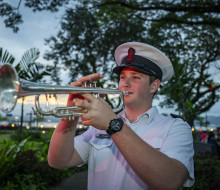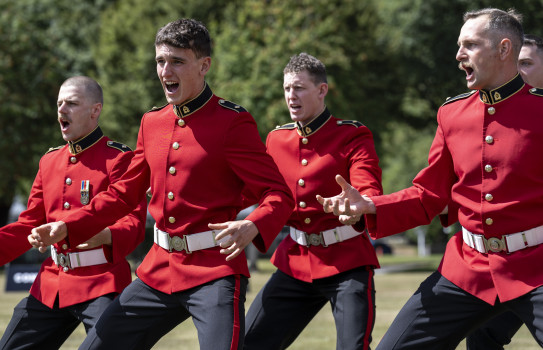
Taupō trumpeter in demand in brand new career with Royal New Zealand Navy Band
26 August 2025
Unfortunately you are viewing this website on an outdated browser which does not support the necessary features for us to provide an adequate experience. Please switch to a modern browser such as latest version of Google Chrome, Mozilla Firefox, Apple Safari or Microsoft Edge.
Ngā mihi nui
Clearing a route, securing a rival Unmanned Aerial Vehicle (UAV) crash site and capturing critical technology before the opposition recover it is an exercise in planning, preparation, and adapting to change for Jack Eggleston.
The 21-year-old, who attended Auckland’s Mt Albert Grammar School, is now studying law at the University of Canterbury but recently found himself being tested on the Central Volcanic Plateau as part of his role with the New Zealand Army Reserve Force.
Directed to navigate his platoon through featureless terrain on a routine patrol in the Waiouru Military Training Area, Second Lieutenant Eggleston received an unexpected radio order.
Headquarters confirmed an adversary UAV had crashed nearby and there was possibly an adversary reconnaissance group operating in the area.
Second Lieutenant Eggleston was now tasked with securing the site and capturing the critical technology from the wreck. Quickly re-evaluating his plan he directed the platoon to locate, secure the crash site, and capture the technology.
This task formed part of his final field assessment for the 2025 NZ Army Territorial Force Commissioning Course.
The course required each of the 18 graduating officer cadets to complete similar assessments while managing fatigue, heat and tight time constraints.
Run bi-annually, the intensive 51-day course is designed to prepare officer cadets with junior command and management skills, setting them up to be effective junior officers within their units.
Captain Blair Siegel, the Officer in Charge of the training, says cadets need to learn, process and selectively pass on information to their platoon to achieve the mission.
“The training is intense and decisions are made while mentally and physically fatigued.”

Second Lieutenant Eggleston, second from left, performs a haka as part of the NZ Army Territorial Force Commissioning Course graduation ceremony
The course includes a significant classroom component where cadets learn to translate, prepare, and deliver orders aligned with the commander’s intent, the vision of how the commander wants the mission to be carried out.
They are introduced to the Plan, Initiate, Control, Support, Inform, and Evaluate (PICSIE) leadership model, participate in teamwork tasks, and deliver presentations to command.
On completing the course, junior officers are expected to plan and conduct platoon-level training weekends and potentially lead the platoon in training. Prior to the course candidates express interest in commissioning and attend a five-day Officer Selection Board evaluation involving individual and team activities.
“Some cadets may never have been put under this type of intensive physical and mental pressure so it really pushes them out of their comfort zone,” Captain Siegel said.
“At completion of the training we have a junior commander who can be immediately utilised and mentored to further develop their skills.”
Now graduated and promoted, Second Lieutenant Eggleston said the leadership training “gave us the skills to think efficiently and effectively even while fatigued and under stress”.
He is now a platoon commander in Canterbury Company, 2/4 Royal New Zealand Infantry Regiment.